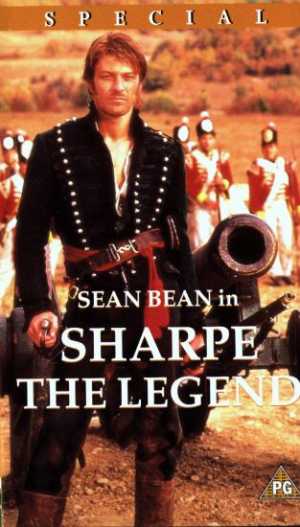 Main Cast
Main Cast Main Cast
Main CastThe faithfulness of the movies to the books varies from film to film. The Films are in a different order, and this places serious constraints on the story content of some of them. In general, even when the films and books are close the action is moved from cities to villages, battles are simplified where possible, and the number of characters is reduced. The films introduce a number of Riflemen who "stick" with Sharpe through the series or until killed. As far as historical background goes, the jump from Eagle (1809) to Company (1812) to Enemy (1812-13) left the series producers with very little war in which to slot 'Gold', 'Battle' and 'Sword' between the later books.
They had actually planned to film "Sharpe's Gold" in the first season, but when Paul McGann, the original choice for Sharpe, injured himself they had to find a new actor and reshoot from the start. Time was against them and it was abandoned. A film of this name was filmed in season 3, but was based on an original story. "Sharpe's Battle" of course was written while they were filming the second season (in which it would have been the first story) but I can't for the life of me see why they didn't put "Sharpe's Sword" in order!
Don't let that put you off. Sit back, forget chronological accuracy, and enjoy.
| Date | Title/Place | cf Book |
| 1809 Apr-Jun |
Sharpe's Rifles Portugal |
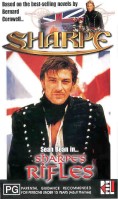 The book takes place in January, during the retreat to Corunna/Vigo. The film takes place after Wellesley's return to Portugal (End Apr) probably after Oporto (May), when all the rifles in Portugal were part of the Battalions of Detachments. In the book Sharpe is already commissioned, and Vivas wants to take a city (Santiago) not a village. The early introduction of Teresa eliminates the semi-romance with Louisa Parker. Has several glaring inaccuracies in it like a standard and drummer for a company of rifles. Also Harry Smith & Co would have been insulted to see a company of Rifles surprised so easily. They prided themselves on never being caught napping! Rifleman Cooper comes out with one of the all-time classic lines: "It's very hard to trust a man who wants to borrow your picklock, sir." The book takes place in January, during the retreat to Corunna/Vigo. The film takes place after Wellesley's return to Portugal (End Apr) probably after Oporto (May), when all the rifles in Portugal were part of the Battalions of Detachments. In the book Sharpe is already commissioned, and Vivas wants to take a city (Santiago) not a village. The early introduction of Teresa eliminates the semi-romance with Louisa Parker. Has several glaring inaccuracies in it like a standard and drummer for a company of rifles. Also Harry Smith & Co would have been insulted to see a company of Rifles surprised so easily. They prided themselves on never being caught napping! Rifleman Cooper comes out with one of the all-time classic lines: "It's very hard to trust a man who wants to borrow your picklock, sir." |
| 1809 Jul |
Sharpe's Eagle Talavera |
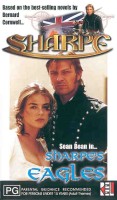 Book and film are both set during the lead up to Talavera. Teresa has been introduced early, so there is no affair with Josefina. Military affairs are simplified to reduce the number of men required, and the amount of sets to build. Fairly faithful to the book with incidents simplified rather than eliminated (e.g. in the book, the whole of the Sth Essex marches over the bridge, not just the Light Company). This was the first time the series hit what was to be a continuing problem - how to depict a big battle on a TV budget. They never really solved it successfully. Book and film are both set during the lead up to Talavera. Teresa has been introduced early, so there is no affair with Josefina. Military affairs are simplified to reduce the number of men required, and the amount of sets to build. Fairly faithful to the book with incidents simplified rather than eliminated (e.g. in the book, the whole of the Sth Essex marches over the bridge, not just the Light Company). This was the first time the series hit what was to be a continuing problem - how to depict a big battle on a TV budget. They never really solved it successfully. |
| 1812 Jan-Apr |
Sharpe's Company Ciudad Rodrigo, Badajoz |
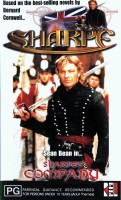 Very similar to book but simplified. The characters of Knowles and Price are combined so Price dies here, and comes back to life when needed. The attempt to blow the Fort San Roque dam is replaced by a picket duty, but the problem of Sharpe taking over whenever Rymer dithers is the same. The incident where Rymer (having made the men pile arms in camp before marching out to sap) is caught out by a sally is based on real incidents. Grattan describes them as having been caused by inexperienced captains. Sharpe and Teresa's marriage isn't covered at the end. Nairn replaces Hogan, introduced earlier than in the books. Very similar to book but simplified. The characters of Knowles and Price are combined so Price dies here, and comes back to life when needed. The attempt to blow the Fort San Roque dam is replaced by a picket duty, but the problem of Sharpe taking over whenever Rymer dithers is the same. The incident where Rymer (having made the men pile arms in camp before marching out to sap) is caught out by a sally is based on real incidents. Grattan describes them as having been caused by inexperienced captains. Sharpe and Teresa's marriage isn't covered at the end. Nairn replaces Hogan, introduced earlier than in the books. |
| 1812-1813 Dec-Jan |
Sharpe's Enemy Portuguese Border |
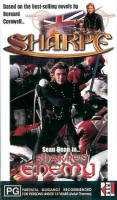 Less detailed than the book, with military action simplified. Fighting in only one place, rather than on both sides of a pass, and (of course) the size of the contending forces much reduced. In the book Lady Farthingdale turns out to be Josefina, and not really married at all. One of the series' really nice and honourable Frenchmen, Dubreton appears. (Dubreton was the name of the French commander at Burgos.) Less detailed than the book, with military action simplified. Fighting in only one place, rather than on both sides of a pass, and (of course) the size of the contending forces much reduced. In the book Lady Farthingdale turns out to be Josefina, and not really married at all. One of the series' really nice and honourable Frenchmen, Dubreton appears. (Dubreton was the name of the French commander at Burgos.) |
| 1813 Jun |
Sharpe's Honour Vittoria |
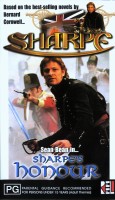 Similar to the book, except that in the books this comes after "Sword" in which he has an affair with the Marquesa. Once again large places become small
(Burgos becomes Santa Maria). The Crimean weather was unkind, and it snowed when they were trying to film a June battle. Though it had been an exceptionally cold spring and early summer in 1813, it didn't snow. There actually was a well known partisan priest who had a bandit brother! Similar to the book, except that in the books this comes after "Sword" in which he has an affair with the Marquesa. Once again large places become small
(Burgos becomes Santa Maria). The Crimean weather was unkind, and it snowed when they were trying to film a June battle. Though it had been an exceptionally cold spring and early summer in 1813, it didn't snow. There actually was a well known partisan priest who had a bandit brother!I thought they missed a great opportunity in the ghost scene - when Sharpe complains that "I'm a soldier, not a spy", Nairn should have snapped straight back "You're dead!" instead of waffling on. |
| 1813 Aug? |
Sharpe's Gold Nth Spain |
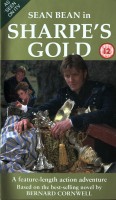 The book takes place in 1810, with the fall of Almeida, the retreat to Torres Vedras, and Wellington's hunt for funds to pay for the work on the Lines. This is where Teresa is introduced in the books. Most of the book has been covered in other films and what is left doesn't fit in with post-Vittoria (e.g. Wellington chronically short of money), so this is in effect an original story. About the only bit of the book to survive is Sharpe's run-in with the provosts. The book takes place in 1810, with the fall of Almeida, the retreat to Torres Vedras, and Wellington's hunt for funds to pay for the work on the Lines. This is where Teresa is introduced in the books. Most of the book has been covered in other films and what is left doesn't fit in with post-Vittoria (e.g. Wellington chronically short of money), so this is in effect an original story. About the only bit of the book to survive is Sharpe's run-in with the provosts.Wellington's Irish cousin turns up at HQ with her daughter demanding that Wellesley mount a search for her husband. He's a vague man who's been 'exploring' for the army, but failed to return from his last trip. The women set out on their own to search for him, and Sharpe is obliged to hunt for them and runs into a bit of transplanted Aztec culture! I've seen it described as "Sharpe does Indiana Jones" and that sums it up. Forget the history and settle down for some enjoyable hokum. |
| 1813 Sept |
Sharpe's Battle Nth Spain |
 The book takes place in 1811, finishing with Fuentes de O&ntiled;oro. But the feud with Loup is still there, as is the Irish Company, Kiely, Wagonmaster Runciman and the false partisan. Lady Kiely is an addition, and the Portuguese are left out. Fairly close despite the time shift (the front line is up near the Pyrenees, and there's no big battle at the end). There were a lot of Hispano-Irish in the Spanish army (Juan O'Donoju, Gonzalo O'Farrill, several O'Donnells not to mention Juan Van Halen) and probably quite a few in the Royal Guard, but no specific Irish regiment. There's an untidy thread left dangling in that they don't explain why Wellesley tells Sharpe he is still in trouble at the end, which would have been easy and tidied things up. The book takes place in 1811, finishing with Fuentes de O&ntiled;oro. But the feud with Loup is still there, as is the Irish Company, Kiely, Wagonmaster Runciman and the false partisan. Lady Kiely is an addition, and the Portuguese are left out. Fairly close despite the time shift (the front line is up near the Pyrenees, and there's no big battle at the end). There were a lot of Hispano-Irish in the Spanish army (Juan O'Donoju, Gonzalo O'Farrill, several O'Donnells not to mention Juan Van Halen) and probably quite a few in the Royal Guard, but no specific Irish regiment. There's an untidy thread left dangling in that they don't explain why Wellesley tells Sharpe he is still in trouble at the end, which would have been easy and tidied things up. |
| 1813 Sept |
Sharpe's Sword Franco-Spanish frontier |
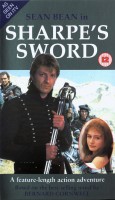 Transposed from 1812 and the Salamanca campaign. The attack on the Salamanca forts is replaced by an attack on the fictional Villafranca fort. Sharpe is wounded in battle, rather than in fighting Leroux. And the affair with the Marquesa (Leroux's sister) is cut. We have Lass instead. Curtis is still there as is the friendly but traitorous Jack Spears whose heart isn't really in his perfidy. Curtis was a historical figure, head of the Irish college at Salamanca and one of Wellington's top intelligence agents. By the end of 1812 he was openly visiting Wellington at his headquarters (see Larpent). Transposed from 1812 and the Salamanca campaign. The attack on the Salamanca forts is replaced by an attack on the fictional Villafranca fort. Sharpe is wounded in battle, rather than in fighting Leroux. And the affair with the Marquesa (Leroux's sister) is cut. We have Lass instead. Curtis is still there as is the friendly but traitorous Jack Spears whose heart isn't really in his perfidy. Curtis was a historical figure, head of the Irish college at Salamanca and one of Wellington's top intelligence agents. By the end of 1812 he was openly visiting Wellington at his headquarters (see Larpent). |
| 1813 Jul-Aug |
Sharpe's Regiment England |
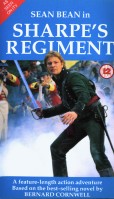 The problem of transposing earlier stories to 1813 really hits home here. There just isn't enough of 1813 left. Very close to the book with the presentation at court, the attempt on his life, rejoining as volunteers, and the man hunt through the marsh. Can't understand why he took Jane when he could have had Lady Anne. The problem of transposing earlier stories to 1813 really hits home here. There just isn't enough of 1813 left. Very close to the book with the presentation at court, the attempt on his life, rejoining as volunteers, and the man hunt through the marsh. Can't understand why he took Jane when he could have had Lady Anne. |
| 1813 Winter |
Sharpe's Siege Sth France |
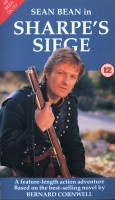 Timewise almost back on track. The book is set during the investment of Bayonne in December, but this pushes them well into France, so the film is set earlier. The story has been simplified (e.g. they've got rid of the navy so they don't have to do expensive ship and sea scenes) but Bamfylde still deserts Sharpe and his men, and they still find out at the end that they've been used to tie down Calvet's division while the main attack goes on elsewhere. Gotta love Calvet and his batman! Timewise almost back on track. The book is set during the investment of Bayonne in December, but this pushes them well into France, so the film is set earlier. The story has been simplified (e.g. they've got rid of the navy so they don't have to do expensive ship and sea scenes) but Bamfylde still deserts Sharpe and his men, and they still find out at the end that they've been used to tie down Calvet's division while the main attack goes on elsewhere. Gotta love Calvet and his batman! |
| 1813-1814 Winter |
Sharpe's Mission Pyrenees |
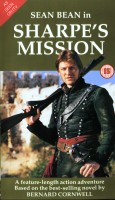 Original story. To be in the Pyrenees, this has to be set before 10 Nov 1813, which is a problem since "Siege" is set in France in December. Original story. To be in the Pyrenees, this has to be set before 10 Nov 1813, which is a problem since "Siege" is set in France in December.Years before Sharpe was witness to an insane bit of bravery which made young Major Brand a hero, especially to Sharpe. Now Brand's the leader of a reconnaisance troop, Brand's Boys, operating behind French lines to gather intelligence for Wellington and stir up trouble. But Wellington thinks he's out of control. So when a rumour arrives about the location of a French ammunition dump, Wellington sends his intelligence chief, Colonel Ross, to investigate with Brand's Boys, Sharpe's Rifles, and an unhappy explosives expert from Ross's past as escort. |
| 1814 Apr |
Sharpe's Revenge Sth France Toulouse |
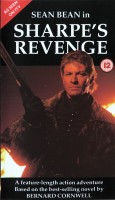 Timewise the films are back on track, and this is set just after the battle of Toulouse. With the usual limitations imposed by the transfer between media, this is pretty close to the book. With Napoleon's fall, Ducos turns traitor and decides to ensure his future with Napoleon's treasure. Trouble is, he decides to even old scores by framing Sharpe for the theft. The key person is a certain Colonel Maillot, who has a beautiful sister, Lucille. A lot of trotting around the country (not to mention between countries) which makes the book difficult to adapt, but they succeed fairly well. Timewise the films are back on track, and this is set just after the battle of Toulouse. With the usual limitations imposed by the transfer between media, this is pretty close to the book. With Napoleon's fall, Ducos turns traitor and decides to ensure his future with Napoleon's treasure. Trouble is, he decides to even old scores by framing Sharpe for the theft. The key person is a certain Colonel Maillot, who has a beautiful sister, Lucille. A lot of trotting around the country (not to mention between countries) which makes the book difficult to adapt, but they succeed fairly well.I found Sharpe's sudden decision to bed Lucille a bit much, particularly as he's well aware of Sweet William's interest. He usually values his few friends and is scrupulous of their interests. But since it's in the book, we have to accept it. |
| 1814 Summer |
Sharpe's Justice England Yorkshire |
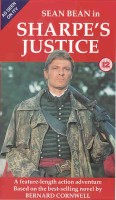 Original story set between Toulouse and the Waterloo campaign based in part on incidents described by Harry Smith which occurred after the war. Original story set between Toulouse and the Waterloo campaign based in part on incidents described by Harry Smith which occurred after the war.Once back in England, with little prospect of further employment in the army, Sharpe accepts a job commanding a troop of militia. As was usual then, the militia are being used as police, in this case in a Yorkshire town where civil unrest is threatening the local weaving industry. After years under Wellington with respect for foreign civilan populations strictly enforced, Sharpe finds it difficult to share the Militia's view of his fellow countrymen as the enemy. As Sharpe tries to control the unrest without resorting to violence, he begins to suspect that tensions are being aggravated by someone with an ulterior motive. |
| 1815 Jun |
Sharpe's Waterloo Waterloo |
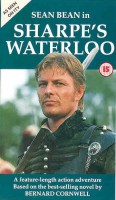 The longest book and the longest video. Sticks fairly close to the book, which is a mistake in this case, because they just didn't have the budget to do Waterloo properly. Until then the film works well, with Sharpe, as Silly Billy's aide, scouting for the Dutch-Belgians and attending the Duchess of Richmond's famous ball. But when we get to Waterloo, it doesn't ring right. Waterloo was a big, crowded battle, wreathed in smoke and extensively described. Sharpe being able to run around relatively empty fields doing whatever he likes just doesn't ring true. The battle scenes are the weakness in this otherwise good adaptation. My own particular gripe - why did they have to kill Hagman and Harris like that? The longest book and the longest video. Sticks fairly close to the book, which is a mistake in this case, because they just didn't have the budget to do Waterloo properly. Until then the film works well, with Sharpe, as Silly Billy's aide, scouting for the Dutch-Belgians and attending the Duchess of Richmond's famous ball. But when we get to Waterloo, it doesn't ring right. Waterloo was a big, crowded battle, wreathed in smoke and extensively described. Sharpe being able to run around relatively empty fields doing whatever he likes just doesn't ring true. The battle scenes are the weakness in this otherwise good adaptation. My own particular gripe - why did they have to kill Hagman and Harris like that? |
| 1809-1815 | Sharpe: The Legend |
Compilation video (ie what the producers considered all the "best bits") narrated by Michael Mears in character as Cooper. |
| 1996 | Sharpe's Victory Ukraine, Turkey, England etc |
 Not a video, but the book of the series. A brief introduction to the people involved, the stories, the behind the scenes work, locations and a (very) little historical background. Plenty of pictures though. Not a video, but the book of the series. A brief introduction to the people involved, the stories, the behind the scenes work, locations and a (very) little historical background. Plenty of pictures though. |
 The complete collection of Sharpe movies is now available in a Region 2, PAL Boxed Set of DVDs. No sign of a Region 4 release. The censorship of GREED strikes again!
The complete collection of Sharpe movies is now available in a Region 2, PAL Boxed Set of DVDs. No sign of a Region 4 release. The censorship of GREED strikes again!
One of the many attractions of the series was the end credit music, "Over the hills and far away". This English folk song dates back to the time of Queen Anne and was sung by the army in various forms thereafter. John Tams (a well known English folk singer who plays the part of the ex-poacher Hagman) wrote (and sang) a series of new verses for the earlier movies.
Go to Over the Hills and Far Away
Return to Sharpe - The Novels
Return to How I got Hooked
Return to Main Page
Content Copyright © 2000, 2001, 2002, 2003 Susan H Law and her licensors. All rights reserved.
Last update 17/3/03